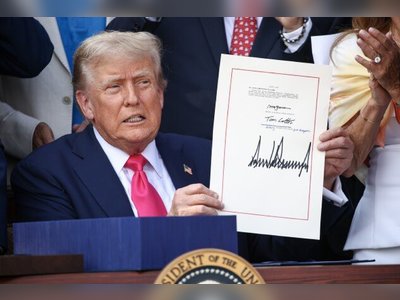Portugal's Government Faces Fresh Elections Following Confidence Vote
Prime Minister Luís Montenegro's administration is set to dissolve after losing a no-confidence vote, triggering potential elections in May.
Portugal's political landscape has been thrown into uncertainty as Prime Minister Luís Montenegro's minority government suffered a significant loss in a vote of confidence.
In a decisive vote, Members of Parliament (MPs) rejected the motion by a margin of 142 to 88, marking the end of Montenegro’s right-of-centre administration, which had been in power for less than a year.
The confidence motion was initiated by the government itself, following opposition pressure stemming from allegations regarding Montenegro's business dealings with his consultancy firm, Spinumviva.
The opposition Socialists have called for a parliamentary inquiry into these activities, raising concerns about the legitimacy of the firm's operations and its financial connections.
Since becoming president of the Social Democratic Party (PSD) and leader of the opposition in 2022, Montenegro transferred ownership of Spinumviva to his wife and two sons.
Questions have arisen over the legality of this transfer, particularly due to the couple's shared asset arrangement.
Recently, the couple has further modified ownership, designating their sons as the sole owners of the company.
Despite the changes, doubts linger regarding the firm’s income sources, which reportedly included monthly payments from the Solverde hotel and casino group, whose gambling concession is currently up for review.
The Prime Minister has refrained from disclosing the identities of other clients or the specific services provided by Spinumviva, which he claims are related to data privacy consultancy, outsourced to external experts.
In light of the mounting scandal, the Bar Association has commenced an investigation into whether Spinumviva is conducting business that could be classified as illegal practice for lawyers.
As these issues unfold, Montenegro’s cabinet has rolled out various spending initiatives in an effort to showcase its commitment to governance.
However, the timing of these responses may be overshadowed by the political positioning of parties like Chega, the far-right faction that has capitalized on allegations of corruption in Portuguese politics.
Chega's surge comes in the wake of former Prime Minister António Costa's resignation amid a separate investigation into government contracts, although Costa has not been implicated as a suspect.
Public opinion polls indicate a shift, with Montenegro's coalition, including the conservative People's Party, trailing the opposition Socialists, led by Pedro Nuno Santos, a former minister under Costa.
While the major parties generally dissent against a snap election out of concern for voter fatigue, the political scene appears set for fresh elections in May, as President Marcelo Rebelo de Sousa is expected to dissolve the parliament following the confidence vote.
Nuno Santos has expressed a firm stance against supporting any governmental confidence motions, complicating the landscape for possible coalitions should elections proceed.
The context surrounding the forthcoming elections reflects a broader concern among political analysts regarding the implications for governance stability amid rising public scrutiny.
In a decisive vote, Members of Parliament (MPs) rejected the motion by a margin of 142 to 88, marking the end of Montenegro’s right-of-centre administration, which had been in power for less than a year.
The confidence motion was initiated by the government itself, following opposition pressure stemming from allegations regarding Montenegro's business dealings with his consultancy firm, Spinumviva.
The opposition Socialists have called for a parliamentary inquiry into these activities, raising concerns about the legitimacy of the firm's operations and its financial connections.
Since becoming president of the Social Democratic Party (PSD) and leader of the opposition in 2022, Montenegro transferred ownership of Spinumviva to his wife and two sons.
Questions have arisen over the legality of this transfer, particularly due to the couple's shared asset arrangement.
Recently, the couple has further modified ownership, designating their sons as the sole owners of the company.
Despite the changes, doubts linger regarding the firm’s income sources, which reportedly included monthly payments from the Solverde hotel and casino group, whose gambling concession is currently up for review.
The Prime Minister has refrained from disclosing the identities of other clients or the specific services provided by Spinumviva, which he claims are related to data privacy consultancy, outsourced to external experts.
In light of the mounting scandal, the Bar Association has commenced an investigation into whether Spinumviva is conducting business that could be classified as illegal practice for lawyers.
As these issues unfold, Montenegro’s cabinet has rolled out various spending initiatives in an effort to showcase its commitment to governance.
However, the timing of these responses may be overshadowed by the political positioning of parties like Chega, the far-right faction that has capitalized on allegations of corruption in Portuguese politics.
Chega's surge comes in the wake of former Prime Minister António Costa's resignation amid a separate investigation into government contracts, although Costa has not been implicated as a suspect.
Public opinion polls indicate a shift, with Montenegro's coalition, including the conservative People's Party, trailing the opposition Socialists, led by Pedro Nuno Santos, a former minister under Costa.
While the major parties generally dissent against a snap election out of concern for voter fatigue, the political scene appears set for fresh elections in May, as President Marcelo Rebelo de Sousa is expected to dissolve the parliament following the confidence vote.
Nuno Santos has expressed a firm stance against supporting any governmental confidence motions, complicating the landscape for possible coalitions should elections proceed.
The context surrounding the forthcoming elections reflects a broader concern among political analysts regarding the implications for governance stability amid rising public scrutiny.












